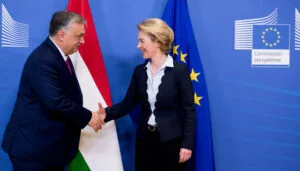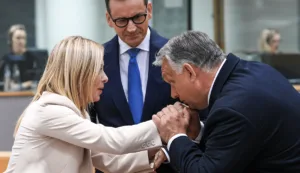Brussels – As the stream of EU money is flowing into the public coffers of Viktor Orbán’s Hungary, tensions between EU institutions in Brussels are becoming increasingly explicit over the European Commission’s decision to unfreeze more than 10.2 billion euros of cohesion, fisheries, and home affairs policy funds. A debate is scheduled for Wednesday morning (Jan. 17) at the plenary session of the EU Parliament precisely on the “situation in Hungary and the released EU funds”—at the end of the one on commission and council statements on the December 14-15 leaders’ summit and on the preparation for the extraordinary Council meeting on Feb. 1—while majority political groups sharpen their knives against the very von der Leyen cabinet they support.

Following the first tranche of 779.5 million that arrived in late December 2023, the EU Commission today (Jan. 15) disclosed the disbursement of the remaining 140.1 million in pre-financing from the €4.6 billion RePowerEu chapter related to the National Recovery and Resilience Plan, approved by the EU executive on Nov. 23, 2023. “These advances will help kick-start the implementation of the crucial investment and reform measures outlined in each chapter of RePowerEu,” reads the community executive’s note: “This will accelerate the realization of the goals of energy savings, clean energy production and diversification of energy supplies.” Unlike the overall NRRP, disbursement of the RePowerEu chapter’s pre-financing amounts is automatic and not constrained by compliance with the “super-objectives” on the rule of law, but in each case, the Commission has the option of recovering “all pre-financing amounts that have not been cleared with regular payment requests” by the end of the duration of the Recovery and Resilience Facility (RRF).
MEPs, however, did not digest the fact that—in parallel with RePowerEu’s pre-financing—the EU Commission decided in December to also release 10.2 billion euros still locked. Ahead of the debate in the plenary session, the chairman of the European People’s Party (EPP), Manfred Weber, had asked the European Parliament’s number one, Roberta Metsola, to proceed with “a thorough analysis of the situation and propose a concrete course of action for the Parliament,” as they were “not convinced by the Commission’s reasoning.” But other political groups have also begun the political offensive against the Berlaymont. “The premature release of the blocked funds to Hungary is unacceptable, the required enabling conditions were not met,” was the attack by Renew Europe spokeswoman Catherine Laurence Martens-Preiss, announcing that Liberal MEPs are ready to include in the resolution “a motion of censure if further blocked funds are released.” A motion of censure is a measure by which the European Parliament expresses its negative opinion on the actions of the executive and, if approved, forces members of the College of Commissioners to resign.

From left: Italian prime minister and president of the European Conservatives and Reformists, Giorgia Meloni, and Hungarian prime minister, Viktor Orbán
Both Renew Europe and Progressive Alliance of Socialists and Democrats (S&D) MEPs in the EU Parliament also support the use of Article 7 of the Treaty on the Functioning of the European Union against Hungary, i.e., the mechanism that allows for the suspension of EU membership rights in the event of a “serious and persistent” violation of the founding principles of the Union by a member country. “Parliament can take a strong position as a whole and send a clear message,” stressed S&D press secretary, Ewan Macphee, at the pre-plenary press conference. The voices of the European right-wingers were dissenting against the majority in the Euro Chamber, with the accusation coming from Identity and Democracy (Id) of having “Orbán as a fetish,” while the spokesman for the European Conservatives and Reformists (ECR) group, Michael Strauss, left the door open to Orbán’s Fidesz party: “Anybody who shares our values can join us,” after which membership “is a decision of the whole group once an application is made, but at the moment it has not arrived.”
The jungle of locked and unlocked EU funds to Hungary
According to the more accurate data provided in May 2023 from the Commission services, the EU funds for Hungary blocked by Brussels stood at 28.6 billion euros, divided into three macro-areas: National Recovery and Resilience Plan (5.8 billion), Cohesion Policy Funds (22.6 billion) and Home Affairs Funds (223 million). The three paths proceed in parallel, each with a specific procedure (or several, depending on the nature of the funding). The first considers the “27 super-objectives” on the rule of law established on November 30 last year by the Commission to release Hungary’s NRRP funds, i.e.,5.8 billion in grants. What is expected from Budapest is that judicial independence will be strengthened, so that judges’ decisions will be “protected from outside political interference.”
The second chapter—definitely the most complex—is about the cohesion policy funds, which for Hungary are worth a total of 22.6 billion euros as funding from the EU budget. Of these funds, 6.3 billion were blocked through the rule of law conditionality mechanism by council decision in December 2022 (and which remain locked). This is a separate procedure involving 55 per cent of the funds allocated to Hungary from three operational programs financed by the European Regional Development Fund (ERDF), the Cohesion Fund, the Just Transition Fund (JTF), and the European Social Fund Plus (ESF+): “Environment and Energy Efficiency Plus”, “Integrated Transport Plus”, and “Spatial and Settlement Development Plus”.
Of the remaining 16.3 billion, 12.9 billion were tied only to the implementation of judicial reforms (without additional criteria) and these are the ones that were partly unlocked by Brussels after the review request. The remaining 3.4 billion are blocked for non-compliance with horizontal enabling conditions—that is, the necessary conditions as far as the EU Charter of Fundamental Rights is concerned—in three disputes between the commission and Hungary: the “child protection” law (the anti-Lgbtq+ law), the academic independence law, and the treatment of asylum seekers law. The first issue is responsible for stalling 3 per cent of the cohesion policy budget (i.e., 678 million), the second by 9 per cent (over 2 billion), and the third by an additional 3 per cent (another 678 million). To unlock these funds it is not enough to put an end to the issues related to the independence of the judiciary (although it remains a pre-requisite for all of these) since the pending issues regarding the other horizontal enabling conditions must also be resolved.

The Prime Minister of Hungary, Viktor Orbán
Finally, there is the last issue to consider, that of the 223.1 million euros from three Home Affairs Funds programs. As learned by Eunews in February from sources inside the EU executive—and then confirmed again in mid-November—it is 69.8 million from the Asylum, Migration and Integration Fund (AMIF), 102.8 from the Border Management and Visa Instrument (BMVI) and 50.5 from the Internal Security Fund (ISF). Although the Commission’s lack of transparency makes it complex to figure out exactly which funds have been unlocked, sources close to the dossier report that it would be both ISF and BmMVI funds (tied exclusively to judicial matters according to implementation decisions), as well as AMIF funds linked to access to asylum (integration) while those linked to non-refoulement (returns) would remain blocked.
English version by the Translation Service of Withub





